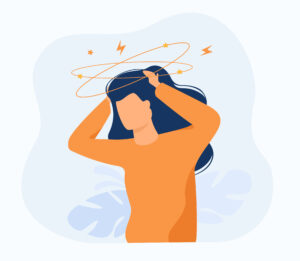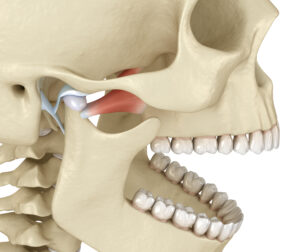
We see a number of patients for Temporomandibular Joint Disorder, known as TMD. In the general public, this is commonly referred to as “TMJ”, although TMJ is an abbreviation for the jaw joints. The “disorder” part comes in to play when the joints are frequently strained, which can result in inflammation within.
Because of our reputation for successful diagnosis and treatment of TMJ disorder, patients come to our Shelby Township MI dental office from a wide vicinity, some from out of state. Too, it’s not unusual to get occasional inquiries from people in other countries who suspect their jaw joints are the source of typically associated problems.
Certainly, I cannot diagnose TMD via online or by phone, although their symptoms are generally indicative of the disorder. These include:
Although bite alignment is usually the triggering source of TMJ disorder, in this article I’d like to focus on the issue of dizziness and vertigo. First, it’s helpful to understand the differences between the two.
Dizziness is a distortion of being in a space and feeling your balance is off kilter. Vertigo, on the other hand, is the sensation of self-movement or movement of your surroundings, almost like a spinning sensation or having things spin around you.
Both vertigo and dizziness, regardless of source, are health risks. Both can increase the risk of falling and injury. They become an especially big concern if dizzy feelings occur while driving or using machinery, which increases the likelihood of accidents.
I have advanced training in neuromuscular dentistry and am not a specialist in otolaryngology. This specialist can evaluate and treat problems affecting the inner ear and refer or recommend the patient for a TMJ evaluation. As a neuromuscular dentist, my extended skills are helpful in analyzing how inner ear problems can affect (or even activate) inflammation that extends from the jaw joints.
This makes TMJ disorder a more common source of vertigo and dizziness than what is often suspected. In some situations, what is the connection to the jaw joints (TMJ) when dizziness or vertigo occurs?
According to the Cleveland Clinic, your sense of balance depends on a combined input from the various parts of your sensory system. (You may be surprised at how minuscule these are.) When it comes to dizziness, these include your:
https://health.clevelandclinic.org/are-vertigo-and-dizziness-the-same-thing/
As mentioned above, vertigo is the false sense that things are spinning or moving. Inner ear disorders can send the brain inconsistent signals with what the eyes and sensory nerves receive. Vertigo results as the brain works to sort out the conflicting signals. Some causes of vertigo are:
IMPORTANT: You should seek emergency medical care if you experience new, severe dizziness or vertigo along with any of the following:
As mentioned in past articles related to bite alignment and jaw joint disorders, a healthy body relies on an intricate integration of the parts around it. For example, the spinal column relies on integrating blood vessels, skeletal bones (vertebra), cushioning discs, joints, nerves and supporting muscles.
Similarly, the jaw joints rely on the unity of how the upper teeth and lower teeth work together. Through this harmony, the connected jaw joints function properly with the unified interaction of correct bite alignment.
The jaw joints hinge the lower jaw to the skull and are one of the most active joints in the body. A disparity in the bite can extend outward to the jaw joints, eventually creating an inflammation. This inflammation doesn’t just remain within the joints, however. Because of the proximity, the inflammation can extend to the interworkings of the ears.
A neuromuscular dentist understands that it takes very little to trigger this domino effect. I’ve seen a number of patients who were told, for years, that their bite was ‘correct’ and their headaches or facial pain were unrelated to their bite. However, having a patient put their top teeth on top of their bottom and slide them back and forth on articulating paper doesn’t really give a full picture of what’s going on, in many cases.
Using advanced diagnostic equipment and training, we’ve been able to pinpoint a number of bite imbalances and jaw joint disorders. Some of these patients had been misdiagnosed or received ineffective treatment (often for years). For some patients, we’ve been able to rule out that their bite or TMJ was the culprit of certain symptoms. For others, we’ve been able to make adjustments to their bite with minor tooth reshaping or new crown(s).
If you feel you are suffering with issues that may be associated with TMJ problems, we offer a no-charge consultation to discuss the diagnostic process. With our advanced technology, it is conducted in one appointment (in most cases) and findings are reviewed promptly. From there, we can explain potential treatment options if, indeed, the jaw joints are the source of your pain or discomfort.
To schedule your free consultation, call 586-739-2155 or tap here to begin. In the meantime, a brief but helpful video is available at: https://youtu.be/ZTOe_QO9kic